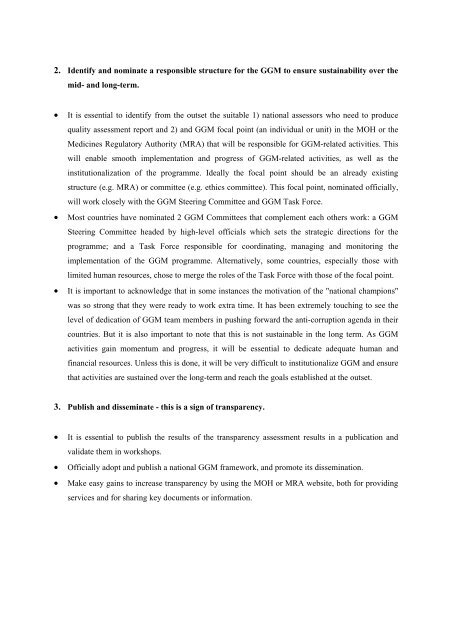WHO Good Governance for Medicines programme: an innovative ...
WHO Good Governance for Medicines programme: an innovative ...
WHO Good Governance for Medicines programme: an innovative ...
You also want an ePaper? Increase the reach of your titles
YUMPU automatically turns print PDFs into web optimized ePapers that Google loves.
2. Identify <strong>an</strong>d nominate a responsible structure <strong>for</strong> the GGM to ensure sustainability over the<br />
mid- <strong>an</strong>d long-term.<br />
• It is essential to identify from the outset the suitable 1) national assessors who need to produce<br />
quality assessment report <strong>an</strong>d 2) <strong>an</strong>d GGM focal point (<strong>an</strong> individual or unit) in the MOH or the<br />
<strong>Medicines</strong> Regulatory Authority (MRA) that will be responsible <strong>for</strong> GGM-related activities. This<br />
will enable smooth implementation <strong>an</strong>d progress of GGM-related activities, as well as the<br />
institutionalization of the <strong>programme</strong>. Ideally the focal point should be <strong>an</strong> already existing<br />
structure (e.g. MRA) or committee (e.g. ethics committee). This focal point, nominated officially,<br />
will work closely with the GGM Steering Committee <strong>an</strong>d GGM Task Force.<br />
• Most countries have nominated 2 GGM Committees that complement each others work: a GGM<br />
Steering Committee headed by high-level officials which sets the strategic directions <strong>for</strong> the<br />
<strong>programme</strong>; <strong>an</strong>d a Task Force responsible <strong>for</strong> coordinating, m<strong>an</strong>aging <strong>an</strong>d monitoring the<br />
implementation of the GGM <strong>programme</strong>. Alternatively, some countries, especially those with<br />
limited hum<strong>an</strong> resources, chose to merge the roles of the Task Force with those of the focal point.<br />
• It is import<strong>an</strong>t to acknowledge that in some inst<strong>an</strong>ces the motivation of the "national champions"<br />
was so strong that they were ready to work extra time. It has been extremely touching to see the<br />
level of dedication of GGM team members in pushing <strong>for</strong>ward the <strong>an</strong>ti-corruption agenda in their<br />
countries. But it is also import<strong>an</strong>t to note that this is not sustainable in the long term. As GGM<br />
activities gain momentum <strong>an</strong>d progress, it will be essential to dedicate adequate hum<strong>an</strong> <strong>an</strong>d<br />
fin<strong>an</strong>cial resources. Unless this is done, it will be very difficult to institutionalize GGM <strong>an</strong>d ensure<br />
that activities are sustained over the long-term <strong>an</strong>d reach the goals established at the outset.<br />
3. Publish <strong>an</strong>d disseminate - this is a sign of tr<strong>an</strong>sparency.<br />
• It is essential to publish the results of the tr<strong>an</strong>sparency assessment results in a publication <strong>an</strong>d<br />
validate them in workshops.<br />
• Officially adopt <strong>an</strong>d publish a national GGM framework, <strong>an</strong>d promote its dissemination.<br />
• Make easy gains to increase tr<strong>an</strong>sparency by using the MOH or MRA website, both <strong>for</strong> providing<br />
services <strong>an</strong>d <strong>for</strong> sharing key documents or in<strong>for</strong>mation.<br />
21

















